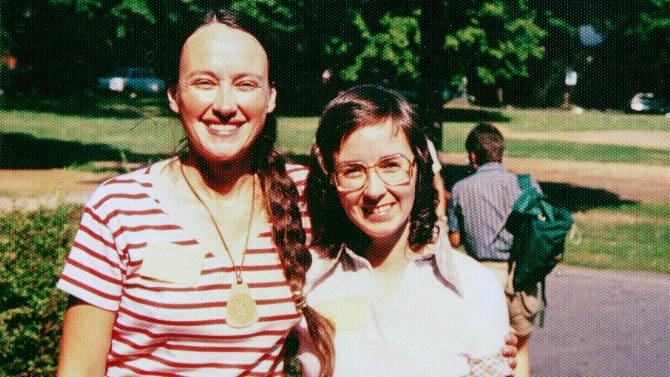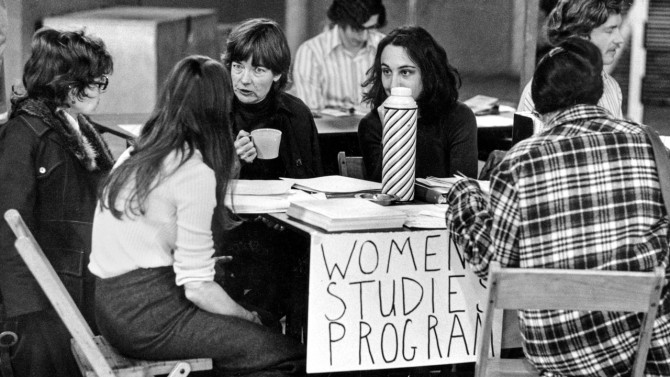As an undergrad, Marylynn Salmon '74 sometimes found herself bored or distracted in classes, but she was never bored in Professor Mary Beth Norton's Racism and Sexism in American History course.
"How much more fun it is to discuss Nancy Shippen's mother-in-law than the Yalta Conference," Salmon wrote in her diary that year. "I'm afraid that I'll never be an intellectual, but rather continue in a romantic strain forever. It's distressing to me. ... I don't seem to possess that driving force that makes one a successful student (or a successful anything). If all that excites me is a young woman's mournful diary, then I'm in trouble."
Salmon soon discovered she was not in trouble, however. "Instead, I had found my way," she now says. She ended up writing an award-winning senior honors thesis on "The Legal Status of Women in Colonial America," went on to earn her Ph.D. at Bryn Mawr College and became a women's historian. Today she's a research associate in history at Smith College.
Salmon is one of the many students who have thrived in classes they took as part of Cornell's Women's Studies Program, now Feminist, Gender and Sexuality Studies (FGSS), part of the College of Arts and Sciences (A&S).
Marylynn Salmon '74, right, and Mary Beth Norton, the Mary Donlon Alger Professor of American History, reunited at the Berkshire Conference of Women Historians in 1978.
As the program celebrates its 50th anniversary this year - along with the 30th anniversary of the LGBT studies program - faculty and alumni from the early days of the program are remembering the barriers they hurdled, as well as the support they received, as they sought to establish the program in 1972. A series of events are planned for throughout the year.
Despite the specific training required for different disciplines, "the friction and the sparks that are created" within and across disciplinary boundaries "are what generate ideas in feminism," said Shirley Samuels, director of women's studies 1996-2000 and professor of English (A&S), during a panel discussion in 2012 as the program celebrated its 40th anniversary.
An interdisciplinary focus from the start
The spark for Cornell's women's studies program came in 1969, when a feminist conference at Cornell, organized by author and activist Sheila Tobias, drew 2,000 attendees and raised questions about the exclusion of women from traditional academic disciplines. A spring 1970 course, The Evolution of Female Personality, drew 400 students, prompting a graduate-student effort to offer workshops and courses. Eventually, faculty - including Norton - decided to create an ad hoc faculty committee focused on women's studies
"We wanted to set up an academically legitimate program so we went to the Arts college and had them designate our group as the program," said Norton, now the Mary Donlon Alger Professor Emerita of American History (A&S). "In the beginning, we didn't have regular faculty with joint appointments; we would just hire people on a one-semester basis to teach courses."
Soon they found that the courses listed under the program were drawing large crowds. As the years progressed, faculty were appointed to the program and more and more students found the courses complemented their other studies.
Daniel Alonso '87 fell into taking women's studies classes because of his psychology major and his interest in the work of Sandra Bem, a psychology professor whose research focused on gender and gender roles. Bem, who also directed the women's studies program, died in 2014.
"I had been looking for something that was more interdisciplinary," said Alonso, who was the first male student at Cornell with a concentration in women's studies. "It was a reorienting perspective for me. Liberal studies had egalitarianism as a theme and in the classes I took, we learned of the outrageous ways women had been treated throughout history."
At center, Jennie Farley '54, M.S. '69, Ph.D. '70, professor of industrial and labor relations and co-founder of Cornell's Women's Studies program, talks with students in this photo from the 1970s. She directed the Women's Studies program 1972-76.
Alonso remembers reading "Herland," a 1915 novel by Charlotte Perkins Gilman that has stayed with him, in Norton's Women's History class. The book depicts a society in which women have evolved so that they don't need men to reproduce. "It was pretty eye-opening and drove home the egalitarian theme."
Though Alonso said he did get some "gentle ribbing" from friends when he mentioned his concentration, he also felt supported by others.
He went on to law school at New York University and is now a partner at Buckley LLP, a legal analyst at NBC News/MSNBC and a frequent contributor and source in media outlets ranging from CNN and Univision to The New York Times and Financial Times. He will teach Transnational Corruption and the Law at Cornell Law School next semester.
"I think a lot of what I studied has become quite mainstream today," he said.
A supportive environment
Celia Naylor '88, concentrated on women's studies after seeking out courses that focused on women's experiences.
"I just knew I wanted to explore more about women's experiences, especially the lived experiences of Black women in the African diaspora," said Naylor. She is now a professor of Africana studies and history and co-chair of the Africana Studies Department at Barnard College, as well as an affiliated faculty member of Barnard's Women's Gender and Sexuality Studies program.
A class taught by Biddy Martin, founding member of the Cornell LGBT studies program, former provost at Cornell and currently president of Amherst College, helped Naylor feel more comfortable exploring discussions about theories, praxis, activism and resistance. "I still remember the tenor of the piercing comments, passionate disagreements and controversial subjects in that class that abided in a supportive, loving class environment," she said. Naylor said she was privileged to take classes with Hortense Spillers and Henry Louis Gates Jr., as well as with Norton and Martin.
As an Africana studies major, Naylor said not all of her friends appreciated her focus on women's studies - especially when they thought the challenges of racism were much more pressing. "It was complicated to navigate the different academic, personal and activist spaces of my life at Cornell, and I learned even more about myself in the process," Naylor said.
For Carrie Nielson '86, Norton's class on Gender Roles in American History led her to do independent study with Norton focused on women in the military. As a Navy ROTC student heading to a military career, Nielson said that work was close to her heart.
"I remember being astounded by all the things I learned about historical female figures and the roles women have played throughout history that I had not previously learned about in school," said Nielson, who went on to have a 30-year career in the Navy.
Filling a need
Alumni say women's studies classes filled a void in the curriculum and made a difference for their future career pathways.
"For me, it came just in the nick of time, and I'm sure the same was true for many other young women at Cornell in the mid-1970s," said Salmon.
During the early days of the program, Norton said faculty thought it would exist for just a short time, until women's perspectives came to be included as a regular part of other disciplines. That hasn't turned out to be the case, and today, research rooted in FGSS-related studies continues to inform the understanding of gender relationships across the disciplines.
"Scholarship has changed dramatically since the 1970s," Norton said. "In 1996, I published a book that dealt with masculinity as well as femininity ("Founding Mothers & Fathers"). That would never have occurred to me in the 1970s."
As faculty and alumni look to the future, they say feminist studies offers a proper approach to address some of the world's biggest challenges, including racism, climate change and threats to our democratic principles. "All of these things have to be thought through in relation to one another because they're all linked," Norton said.
"I would really like to say we have come a long way, and we have, but we also still have a really long way to go," Nielson said.
Kathy Hovis is a writer for the College of Arts and Sciences.








